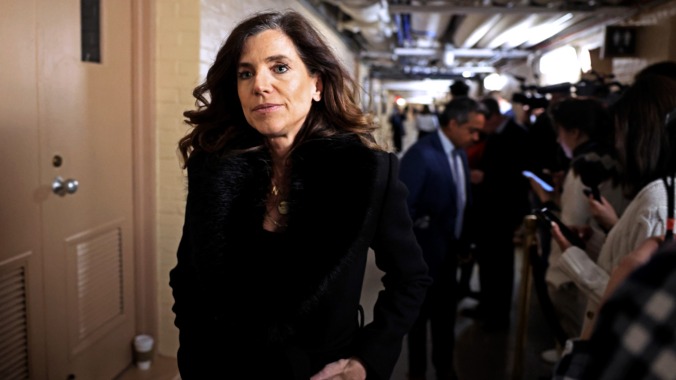Nancy Mace’s ‘Victim Hotline’ Is Just a Voicemail That’s Misleading Victims
Deborah Freel, executive director of Tri-County S.P.E.A.K.S., a sexual assault resource center in Mace’s district, told Mother Jones point-blank that the number “isn’t a hotline" and shouldn't be called one.
Photo: Getty Images Politics
On Monday night, Rep. Nancy Mace (R-S.C.) spoke on the House floor for nearly an hour and accused her ex-fiancé, Patrick Bryant, and three other men of having drugged and sexually assaulted her. In the jarringly graphic remarks, she claimed to have found 10,000 videos of Bryant and his associates sexually assaulting her and dozens of other women and girls on his phone in November 2023. Throughout Mace’s remarks, she stood in front of a bright pink sign that gave a phone number for a “VICTIM HOTLINE.” Mace then promoted this supposed hotline on her social media and claimed in several tweets to be receiving a high volume of calls from domestic violence victims sharing their stories.
Except the “hotline” isn’t a hotline at all.
Mother Jones first reported on Tuesday that Mace’s so-called “victim hotline” is more so, as journalist Julianne McShane put it, a “glorified voicemail.” McShane reported her experience calling several times, each an hour apart, and only getting a pre-recorded message.
I tried calling twice on Wednesday morning. “Hi, this is Congresswoman Nancy Mace, and you’ve reached our office victim hotline. Please note your information is confidential,” the voicemail says. “Please leave a detailed message and we will contact you as soon as possible. You may also text us at this number.” Beep. I sent a text message to the hotline as well, asking if it was Mace’s “victim hotline,” and received this response one hour later:
-

-

-

-

-

-

-

-

-

-

-

-

-

-

-

-

-

-

-

-

-

-

-

-

-

-

-

-

-

-

-

-

-

-

-

-

-

-

-

-








































